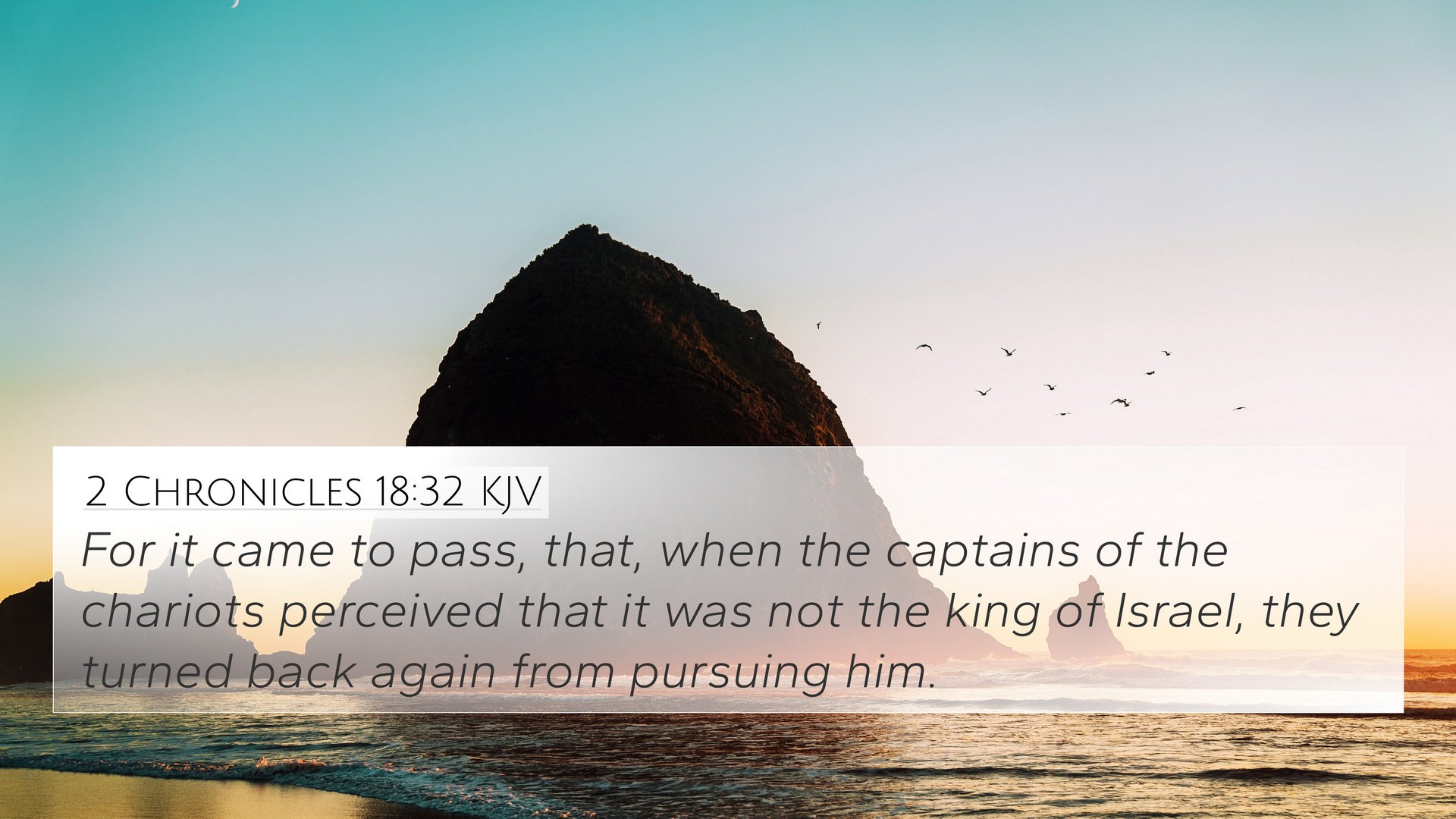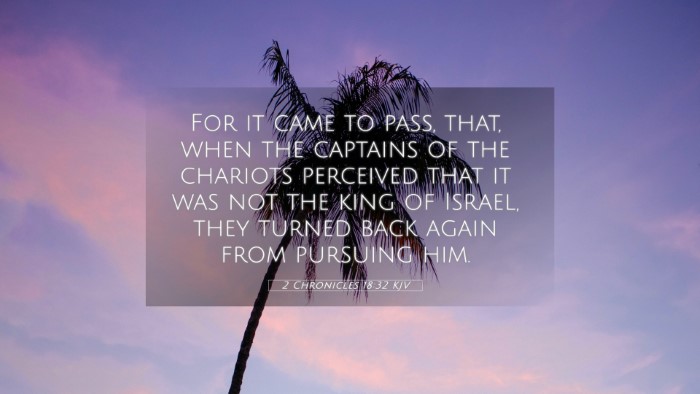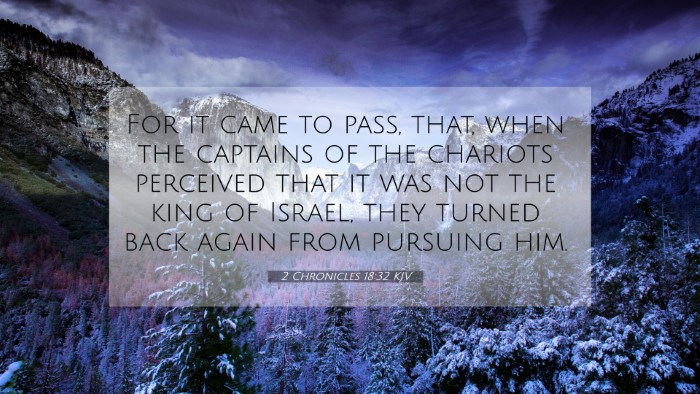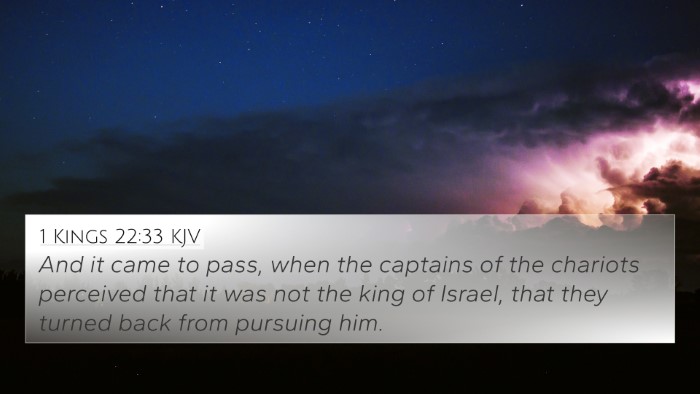Understanding 2 Chronicles 18:32
The verse 2 Chronicles 18:32 states: "And it came to pass, when the captains of the chariots saw Jehoshaphat, that they said, It is the king of Israel. Therefore they compassed about him to fight: but Jehoshaphat cried out, and the Lord helped him; and God moved them to depart from him." This account provides rich thematic elements that can be explored through various commentaries.
Verse Analysis
Matthew Henry notes that this passage illustrates Jehoshaphat's situation during a time of battle, emphasizing the danger he faced. Despite being mistaken for the king of Israel, his cry for help was pivotal in his deliverance. Henry highlights the mercies of God, noting that divine intervention often appears when the situation seems dire.
Albert Barnes offers insight into the nature of the battle, explaining that the captains mistook Jehoshaphat for Ahab. This confusion underscores the peril of standing out in enemy territory. Barnes comments that Jehoshaphat's call for assistance serves as an example of turning to God in times of distress.
Adam Clarke elaborates on the significance of Jehoshaphat’s cry, interpreting it as a heartfelt plea for mercy. Clarke’s commentary suggests that Jehoshaphat’s sincerity invoked God’s protection, which led the enemies to turn away from him. This underscores a theological theme of reliance on divine strength over human bravery.
Thematic Connections and Cross-References
This verse connects with multiple Biblical themes, particularly the importance of divine aid in moments of crisis and the consequences of misidentification among enemies. Here are key cross-references to explore:
- 2 Chronicles 20:9 - Jehoshaphat's prayer for God's intervention.
- 1 Kings 22:32 - The confusion in the battle as Jehoshaphat was mistaken for Ahab.
- Psalms 34:17 - The Lord’s readiness to help those who cry out for aid.
- Isaiah 41:10 - Assurance of God's support in the face of fear.
- Proverbs 15:29 - The Lord's closeness to the righteous when they seek Him.
- James 4:8 - The promise that drawing near to God leads to His nearness to us.
- Hebrews 13:6 - Confidence from the Lord’s assistance in our battles.
Insights on God's Intervention
This verse previously mentions God's intervention as a critical point in Jehoshaphat’s victory. An important takeaway is that God does not leave His people in times of vulnerability. The act of crying out is a demonstration of faith, suggesting a key method in the comprehensive Bible cross-reference system: acknowledging one's reliance on God.
Practical Considerations for Cross-Referencing
For those studying this verse, utilizing tools for Bible cross-referencing can be immensely helpful. Here are some practical tips:
- Consult a Bible Concordance: Locate themes and keywords to discover related scriptures.
- Use a Cross-Reference Bible Study: Explore different interpretations and insight with various translations.
- Engage with Commentaries: Consider multiple viewpoints from respected theologians like Henry, Barnes, and Clarke.
Benefits of Thematic Bible Verse Connections
Creating links between Bible verses enriches one’s understanding of scripture. By examining how these verses relate, individuals can grasp broader theological themes and insights, such as:
- Encouragement in Trials: Stories across the Old and New Testaments reveal consistency in God's faithfulness.
- Human Vulnerability: Characters like Jehoshaphat exemplify reliance on divine providence amidst peril.
- God’s Sovereignty: Instances of divine intervention serve as reminders of God's ultimate authority over chaotic circumstances.
Conclusion
Ultimately, 2 Chronicles 18:32 encapsulates significant truths about faith, recognition of God’s help, and the nature of spiritual warfare. As one engages in cross-referencing Biblical texts, the connections between scripture become clearer, offering deeper insights into God's character and the human experience. This verse, serving as a potent reminder of God’s faithfulness, encourages believers to acknowledge their dependence on Him during their personal battles.
Through comparative Bible verse analysis, one can discover the rich fabric connecting various themes, reflecting the intricate dialogue within scriptures. The exploration of such themes ultimately fosters a greater understanding of Biblical truths that resonate through time.



